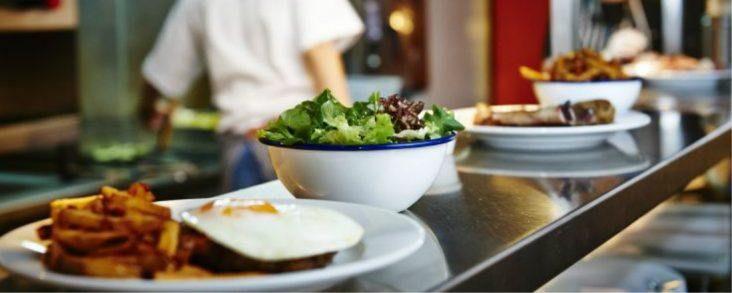Fort Smith Board re-approaches subject of prepared food tax
by April 10, 2018 9:26 pm 1,273 views

The Fort Smith Board of Directors are likely to take up discussion of a prepared food tax at their upcoming April 27 strategic session. The topic came up Tuesday (April 10) at a noon study session during which Tim Seeberg, the Fort Smith Convention Center’s general manager, and Claude Legris, executive director of the city’s advertising and planning commission, presented the Center’s annual report.
The initial topic of conversation focused on weighing a 10% cut to the FSCC’s $777,000 annual subsidy. Director Don Hutchings opposed the cut first suggested by fellow Board member Tracy Pennartz. Director Mike Lorenz approved of discussing the cut, but stopped short of supporting it. On Tuesday, he said the “hugely unpopular” thing that would have to be addressed would be identifying a “dedicated funding source” for the Center.
Following the session, he confirmed to Talk Business & Politics that by “dedicated funding source,” he meant a prepared food tax. The Board has the power to impose the tax without going through voters, but historically, it has avoided that option. A previous election for the purpose of funding the Center failed in November 2011 with 62.7% of voters rejecting the proposed 1% tax, which was estimated to raise $1.8 million. The amount would be more than enough to fund the FSCC which, as many convention centers do, runs with an annual deficit. It was expanded in the late 1990s without a dedicated funding source. Failure on the 2011 vote resulted in the current subsidy.
Lorenz said the Board “does have the option to enact a prepared food tax, which is the way most cities do it.”
“I don’t know the statistics for which cities have gone to voters and which haven’t. And that’s the way it was put together a few years ago, and then there was some public pushback, and the Board backed off. It never went to a vote (among Board members). The Board was afraid it would be defeated publicly. It was poorly marketed and explained at the time, and it came across to the voters as, ‘Uh-oh, we lost our state funding source. We don’t know what to do. So here, this is how we’re going to do it.’”
Before the lapse in funding, state turnback money had funded the Center, so prior Boards chose not to use operational revenues on the Convention Center.
“The operational revenue was not spent on the Convention Center during those ten years (of funding). There was no sinking fund, no capital improvement fund, no nothing, and it was used to support other departments — the senior center, the library, the parks department. So for those ten years, the Convention Center was subsidizing the city departments, and somehow people forget that. That was the wrong decision, and we’re still reaping the bad decisions of 20-plus years ago,” Lorenz said.
When asked whether the Board should enact the tax or put it before voters once again, Lorenz said he didn’t have a position on it, and “that’s what you’re going to see at our strategic planning session.”
He continued: “This time, with the proper education, I would love to see the restaurants, the hotels, the bars, all step up and go, ‘We want this, and here’s why.’ Because they’re the ones that benefit. Nobody else does.”
Still, Lorenz acknowledged winning acceptance through a citywide vote was unlikely unless “you can get the education out enough where people really understand it’s not a sales tax, that it’s not a tax on everything you buy.”
“If you go buy some potato chips in a store, it doesn’t affect you. It’s not going to affect you if you’re going to Walmart and buying groceries and cooking dinner. It’s only if you make the choice to go to a restaurant. And if you look at the fact that most of the business driven from this, 30-40%, is going to come from outside Fort Smith, it’s not a tax on the citizens of Fort Smith. It’s a tax on people using restaurants. How many people work here that eat dinner before they go back home?”
While that’s mostly true, Legris pointed out some fine print with the state statute’s regulation of prepared food taxes that could surprise some consumers.
“If a food is served in a heated or cooled state by the proprietor, that’s a prepared food,” Legris said. “If you combine more than one ingredient to create something, that’s a prepared food. If you utilize a utensil in any way, shape, or form, that’s a prepared food.”
As an example of how nuanced the laws are surrounding prepared food taxes, Legris said a person could “go into the Harp’s and buy bread and meat and cheese, go home and make a sandwich — you’re fine. But if you go to the deli case” and buy a pre-made sandwich from the store’s bakery, “boom (tax).”
“Here’s a wackier one: go into a gas station and buy a Coke out of the cooler, it’s not subject to the tax. But if you go over to that fountain, and you take that cup, and you put ice in it, and you pour the drink in it, you just prepared it. That’s a prepared food because it’s served in a cooled or heated state, and you have to utilize a utensil that’s available from the proprietor. That’s state statute. Now we proposed (last time) and most cities do,” that school systems and hospitals be exempt, Legris said. Using Legris’ example, a 99-cent can of soda bought in Fort Smith would cost around $1.09 with tax, but a 99-cent fountain drink would run $1.10. In the more traditional sense, a $30 meal out with family would be $32.93 without the tax and $33.23 with it.
Many communities in the state already have a prepared food tax, including Alma, Greenwood, and Van Buren.
